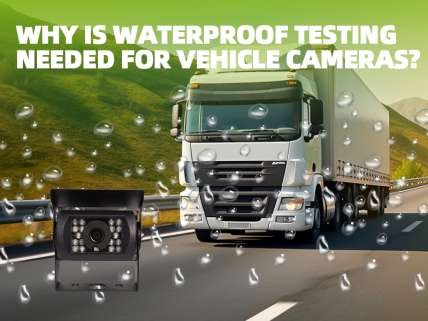Why is waterproof testing needed for vehicle cameras?
Introduce
Vehicle cameras are increasingly prevalent due to their role in enhancing driving safety, compliance with traffic regulations, and providing driver assistance. With technological advancements and consumer demand for high-tech vehicles, these cameras have become an essential component of new car models. Therefore, the durability and reliability of vehicle cameras are crucial—they must operate effectively under extreme weather conditions and resist wear and tear from daily use. This is why vehicle cameras must undergo rigorous waterproof testing to ensure they maintain optimal performance in all circumstances.
Challenges for Vehicle Cameras
1. Exposure to Diverse Environmental Conditions
Vehicle cameras are exposed to a variety of environmental conditions during use, including high temperatures, low temperatures, humidity fluctuations, and the impact of dust and pollutants, all of which can affect the performance and lifespan of the cameras.
2. The Necessity for Functionality in Various Lighting and Weather Conditions
Vehicle cameras need to function in various lighting and weather conditions, such as at night, in tunnels, during storms, or in snowy conditions, to provide stable image quality and accurate visual information.
Necessity of Waterproof Testing
1. Risk of Water Damage from Weather and Vehicle Washing
Vehicle cameras are often exposed to harsh weather conditions such as rain, snow, and other forms of precipitation. Additionally, during car washes, cameras can come into direct contact with water. Without proper waterproof capabilities, water ingress could damage the internal circuits and cause malfunctions.
2. Requirement to Maintain Consistent Performance in Humid Conditions
Vehicle cameras need to provide clear images continuously, especially in humid conditions, to ensure the normal operation of the driving safety system. Therefore, conducting waterproof tests is a crucial step to ensure that cameras maintain their performance and reliability even in wet conditions.
Standards and Certifications
1. Explanation of IP Rating and Its Implications for Vehicle Cameras
The IP rating, defined by the International Electrotechnical Commission, describes the degree of protection an enclosure offers against solids and liquids. For vehicle cameras, a higher IP rating, such as IP67 or IP68, means the camera is dust-tight and can withstand being submerged in water to a certain depth for a specified duration.
2. Waterproofing Industry Standards
Beyond the IP rating, there are other industry standards and certifications that ensure the waterproofing performance of vehicle cameras, such as those from ASTM International and ISO. These standards provide testing methods, equipment requirements, and performance evaluation criteria to help manufacturers design cameras that can withstand various environmental effects.
Conclusion
Waterproof testing is a critical factor in ensuring the reliability of vehicle cameras, as it not only guarantees continuous operation in varying weather conditions but also extends the product’s lifespan. Opting for high-quality vehicle camera systems that have undergone stringent waterproof tests can make driving safer and reduce additional maintenance costs due to equipment failure.
For your driving safety, choosing a trustworthy vehicle camera supplier is crucial. Luview Industry is your reliable choice, a professional manufacturer and solution provider of rear-view safety products from China. Whether you’re looking for vehicle cameras or vehicle rear-view systems, we can meet your needs. Please contact us at [email protected] to learn more details.



